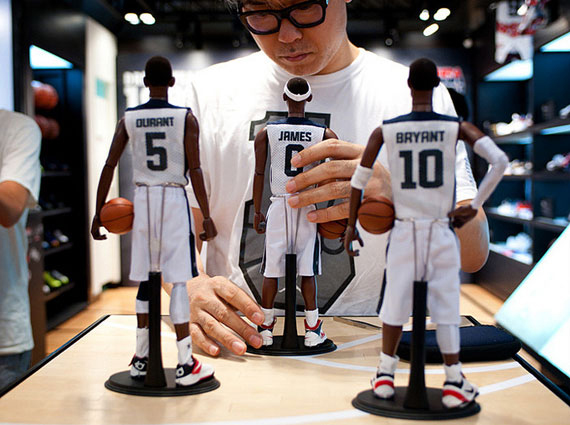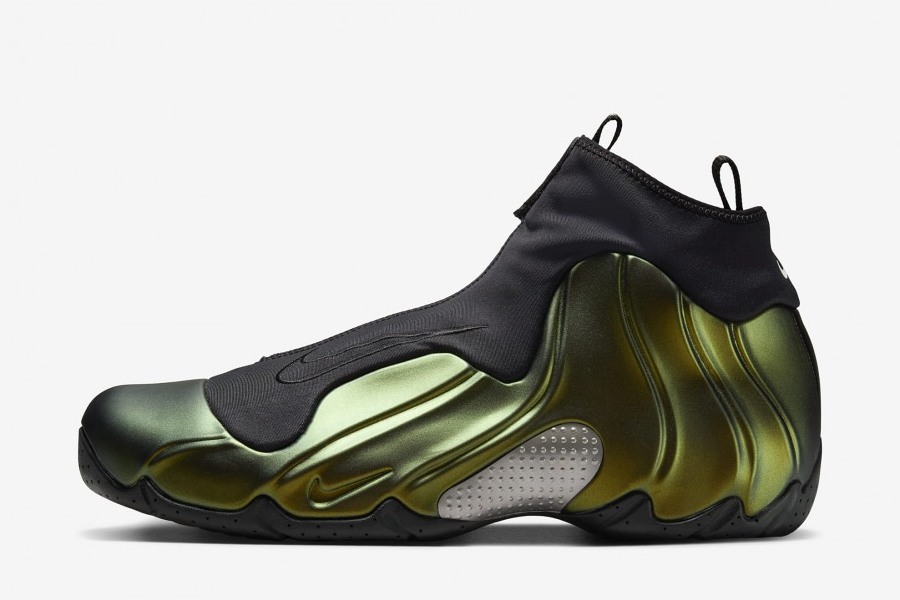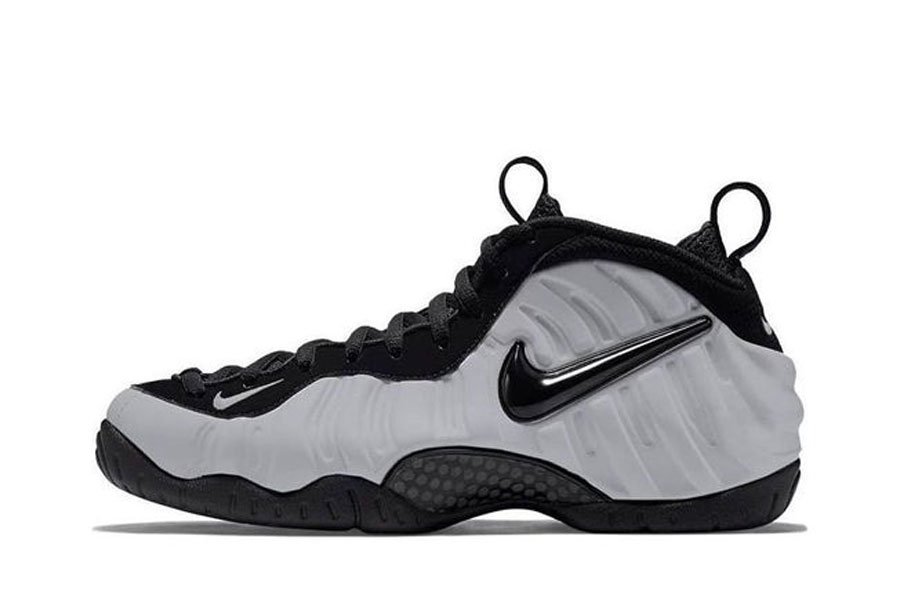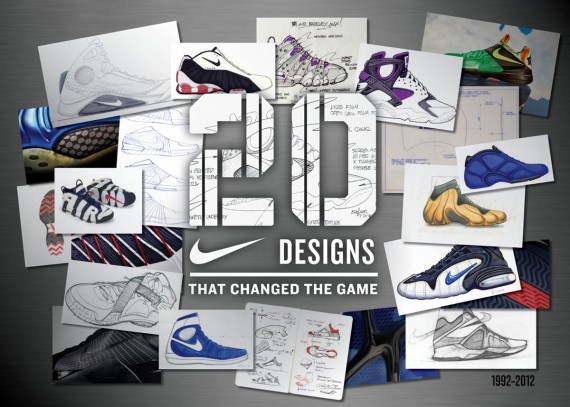
Over the course of the last three weeks or so, Nike Basketball revisited twenty of their most game-changing designs that surfaced over the last two decades. Each installment served a valiant purpose in the evolution of Nike Basketball, from the first Air Force 180 Low and the expanded Air unit, to 2012’s Nike Lunar Hyperdunk+ and the advanced technology of Nike+. Before Nike kicks off another twenty years of game-changing designs, let’s spend a moment and look back at Nike’s retrospective of the amazing basketball-centric models to have come out of the Innovation Kitchen – all of which we’ve compiled below. It’s a worthy exploration of one of Nike’s most progressive sectors of design and function, so if your sneakerhead tendencies go beyond buying whatever’s hot and into the field of study, take a moment to review Nike Basketball’s 20 Designs The Changed The Game below.
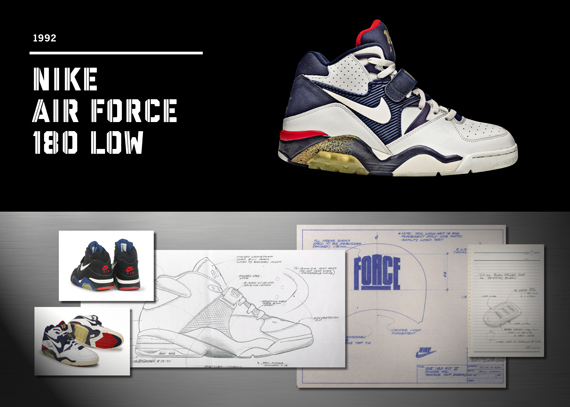
20 Years Of Nike Basketball Design: Air Force 180 Low (1992)
Nike Air Force 180 Low, 1992
“Technology has always been the thing that drives, motivates and consumes us. The Air 180 is the product of that obsession.”- Phil Knight
Catering to powerful players by redefining Air, the Nike Air Force 180 Low represented a significant evolution and extension of Nike Basketball’s design language. At the time of this shoe’s release, Nike Air was almost 14 years old and Visible Air was five. How do you build on those pressurized foundations? By adding 50% more cushioning. Strapping down the player for superior support, it was clear that the 180 and power basketball went together like Barkley and controversy. When this Force hit the hardwood during the summer of 1992, victory was guaranteed. While the shoe has seen plenty of colors, that red, white and blue with a fade to gold represents an iconic moment in sneaker and sporting history. The Nike Air Force 180 Low is a classic shoe —cushioned to protect, but built to intimidate.
–
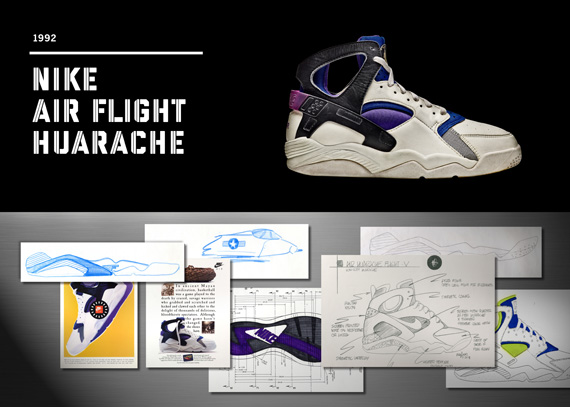
20 Years Of Nike Basketball Design: Air Flight Huarache (1992)
Nike Air Flight Huarache, 1992
“If the shoe fits in with other things that are going on culturally, you get a perfect storm.”- Tinker Hatfield
The Nike Air Flight Huarache’s aesthetic swagger was in what it stripped away. A swoosh? No need for one — it’s not like this shoe could have been made by any other brand. That Dynamic Fit, exoskeleton, leather and neoprene combined to make this one of the purest expressions of performance to date. While a maverick team — led by intuitionist Tinker Hatfield, and assisted by Eric Avar — worked behind the scenes to translate the Huarache running technology to the courts, it took a crew of collegiate game-changers to give the Nike Air Flight Huarache an extra ascent in terms of publicity. That leads to the eternal question: what came first – this rebel shoe like no other, eclipsing a previous decade of bulk, or basketball’s completely new attitude and aesthetic? This shoe would have caused a storm either way, urging those from as far away as the nose bleeds to ask, “What was that?”
–

20 Years Of Nike Basketball Design: Air Raid (1992)
Nike Air Raid, 1992
“That X strap was about strapping up to go into battle, because you’re going to get knocked around the frickin’ cage and you need to strap yourself in.”- Tinker Hatfield
Blame the yellow sticky. It took a small paper note to instigate the most hardwearing Nike shoe to date. Delivered from the very top, it was less a request and more of an instruction — make a shoe for outdoor basketball. That meant now. With Tinker Hatfield sketching and fellow designer Mark Smith deployed to New York the following day to capture the look and mood of the city’s concrete battlegrounds, it became clear that this was a completely different game. This was where big league heroes could be humbled by local legends. That ‘X’ arrived at a moment when knowledge of self and roughneck aesthetics united. Through sheer coincidence, movements converged and a bubbling culture spilled into the Nike Air Raid’s DNA almost unconsciously.
–
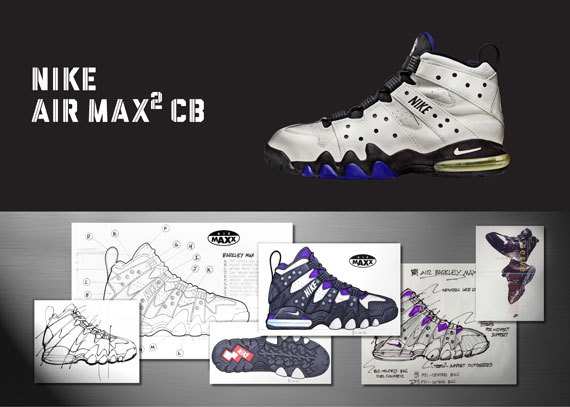
20 Years Of Nike Basketball Design: Air Max2 CB (1994)
Nike Air Max2 CB, 1994
“This became more and more overt as a composition. We wanted to capture Charles’ game and his personality.”- Tinker Hatfield
Charles Barkley had been a Nike athlete since the days of the 1987 Nike Air Force and the low-cut Nike Alpha Force. However, it took a while for him to get that all-important signature model. Maybe it was that on and off court attitude, the team switch or the fact that he’s just “not a role model.” One underlying theme of the shoes Charles endorsed was the need for constant lockdown to tether a force of nature during moments of on-court insanity. The Nike Air Max2 CB incarcerated the foot for its own safety with straitjacket-inspired support straps, reinforced lace locks and teeth-like outriggers.
–

20 Years Of Nike Basketball Design: Air Max Penny (1995)
Nike Air Penny, 1995
“What was great about Penny was that he was always expressive and always willing to push the limits in terms of aesthetics and expression.”- Eric Avar
How do you cater to the player who can’t be defined by an existing category? You create a new lane. Penny’s Hardaway’s strength and athleticism preempted a contemporary style — so much so that his debut Nike signature model, the Nike Air Penny, birthed the Uptempo line. Speed and strength couldn’t be pinned down to a solitary technology, so Penny got a pair of performance aids — a Max Air bag for impact protection and the newly-developed Tensile Air, later renamed Zoom Air, for court feel. The former at the rear and the latter at the front delivered the best of both worlds for a proven combination that’s echoed in contemporary Nike Basketball designs. That 1Cent logo and crystal swoosh exuded confidence, hinting that this was just the start of a relationship rooted in expression and experimentation.
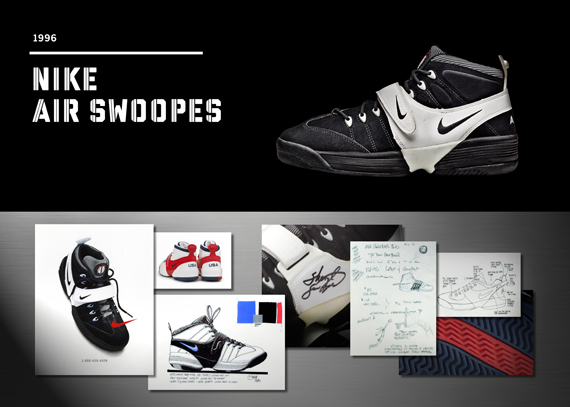
20 Years Of Nike Basketball Design: Air Swoopes (1996)
Nike Air Swoopes, 1996
“She was not a girly girl. She was tough and needed her shoe to be agile and responsive, so that is what we designed.”- Marni Gerber
How much more did Sheryl Swoopes need to do to prove she deserved a shoe of her own? Scoring records for days and plenty of double-doubles before she was out of college earmarked her as the finest women’s basketball player of her era. As a new league dawned in which she would shine, Sheryl was the first female player to get her own signature model. For too long, female players made do with takedowns of men’s models or fell victim to the industry’s shrink and pink afterthought approach to the market. The Nike Air Swoopes was developed with Sheryl’s close assistance, ensuring it catered to the female foot and Her Airness’ needs. The design merged great traction with agility, a rugged black Durabuck, a distinctive midfoot stability strap that cradled the foot, a contrasting color blocking strategy for maximum visibility and Nike Air in the heel and forefoot. The result was an uncompromising blend of support, performance and style.
–
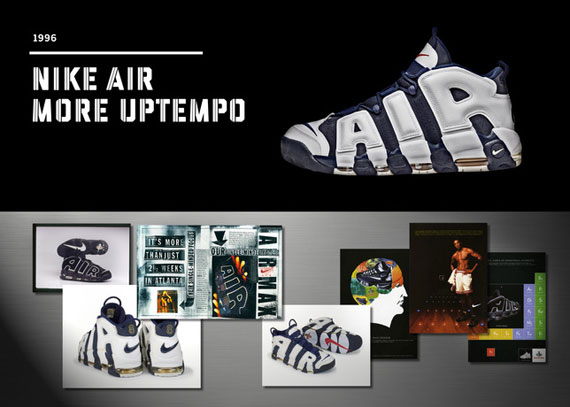
20 Years Of Nike Basketball Design: Air More Uptempo (1996)
Nike Air More Uptempo, 1996
“I think generally, the mid ‘90s were just a bigger-than-life time.”- Wilson Smith
Sometimes less isn’t more — logic is restored, and more is more. The Nike Air More Uptempo took branding to new heights to match an unprecedented application of Nike Air that ran from the toe to the heel. Inspired by the oversized objects in pop art, graffiti on the side of trains and an architectural project he’d worked on, lead designer Wilson Smith worked ‘AIR’ into that upper to drive the point home. In 1996, cars were big and jeans were big. The Nike Air More Uptempo was an extension of the environment. Ideal for the vertical player who needed the lockdown and abundance of cushioning, the Nike Air More Uptempo became Scottie Pippen’s shoe of choice and was showcased on a global stage that summer in iconic USA colors.
–
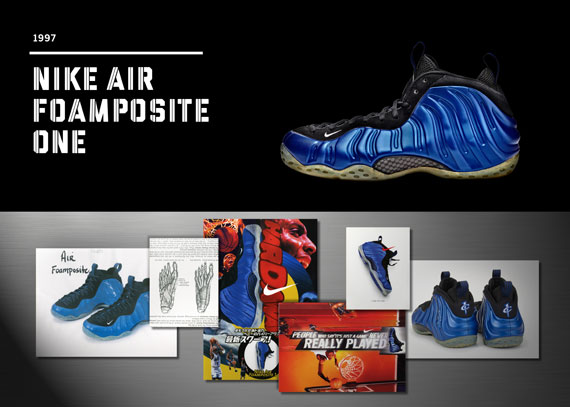
20 Years Of Nike Basketball Design: Air Foamposite One (1997)
Nike Air Foamposite One, 1997
“There was no brief —it was pure experimentation.”- Eric Avar
The Nike Air Foamposite One is a shoe that opened minds and assisted a generation of players. What many don’t know is that it was inspired by sunglass protection. During a meeting with Advanced Product Engineering (A.P.E.), a molded sunglass case on the table became a focal point. Made of EVA foam with a fabric cover, the case was lightweight, but it had structure and form. That inspiration was just the start of a three-year endeavor to develop and refine manufacturing techniques that could reach that end goal. It was a total team effort of designers, developers and engineers. A poured PU envelope would create a seamless fluid structure. Add the performance attributes of Nike’s best basketball footwear at the time and you had a radical departure in design — a high-performing shoe with an unorthodox appearance. Picked out by Penny Hardaway himself, an unorthodox icon was born. Adding iridescent colors to the Foamposite was a logical step in the bold new process, showcasing the dimensions of the shoe and its seamless build.
–
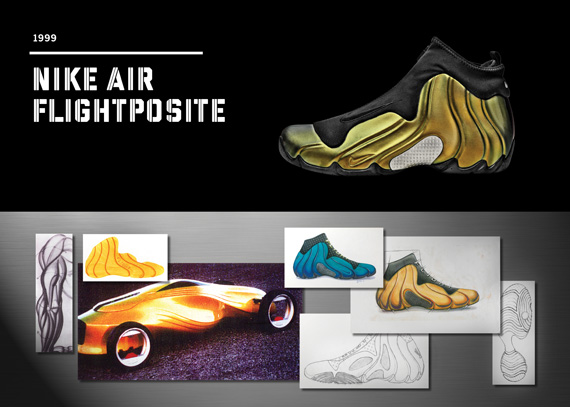
20 Years Of Nike Basketball Design: Air Flightposite (1999)
Nike Air Flightposite, 1999
“We were setting out to create a seamless extension of your body.”- Eric Avar
Where does the body end and the shoe begin? The Nike Air Flightposite succeeded in surprising the audience with a progressive dose of unfamiliarity that felt comfortable and strangely familiar. Its sleek, biomechanical shape communicated a certain level of humanity. Concept cars and the figure drawings of a 17th-century British artist reflected the rich range of physical and engineered influences at work during the design stage. In the quest for biomechanic streamlining, even laces were replaced by a zipper to emphasize a seamless fluidity. The wearer, the shoe and even the sole all merged into one for a holistic look and feel like never before. In the years that followed, the Foam and Flightposite systems would be explored further — proof of the restless, perfectionist, reductionist minds operating in the Nike Innovation Kitchen.
–
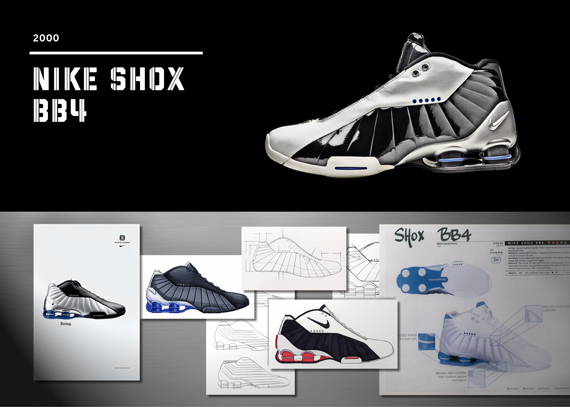
20 Years Of Nike Basketball Design: Shox BB4 (2000)
Nike Shox BB4, 2000
“The objective was for the technology itself to be the focal point — let it be the hero.”- Eric Avar
Sometimes imagination can be tethered by manufacturing limitation. Nike Shox was already a 20-year-old concept at the time of the Nike Shox BB4’s release. The idea was too ahead of the curve, necessitating foam that hadn’t been invented yet. It resurfaced at the tail end of the 1990s, piquing the interest of Eric Avar and the team as a visually expressive technology with a significant performance value. The Nike Shox BB4’s look was informed by its space age concept: a rocket and booster-like appearance was prepped for blastoff and served to amplify the explosive potential of the columns. With the creative team at mission control researching astronaut uniforms, the upper was designed for intergalactic exploration too. Showcased in Sydney that summer, Vince Carter’s iconic dunk of death over a seven-footer while wearing a pair secured his legendary status and drove home the power of the Nike Shox system. Off he went into the stadium atmosphere and we had liftoff. You can’t synthesize that kind of moment, but maybe, just maybe, those columns gave him the confidence to pull off the ultimate “posterized” dunk.
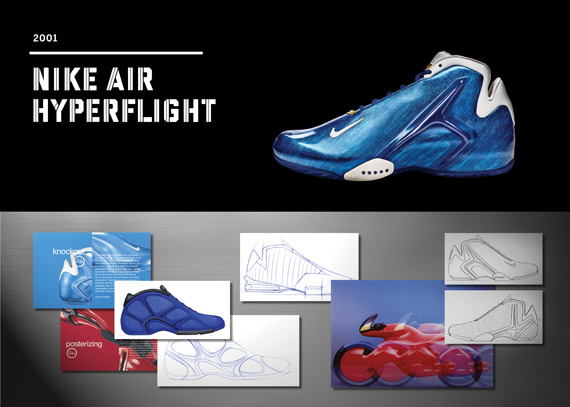
20 Years Of Nike Basketball Design: Air Hyperflight (2001)
Nike Air Hyperflight, 2001
“So if Bill Bowerman was designing a basketball shoe, what would he do?”- Eric Avar
The Nike Air Hyperflight might look defiantly futuristic, but it’s actually rooted in Nike co-founder Bill Bowerman’s tireless quest for less. Inspired by a memorial tribute to Bowerman, lead designer Eric Avar contemplated how Bill would design a basketball shoe. What emerged from his thoughts was an idea for a track spike silhouette for the court. The answer to “What would he do?” became obvious. Avar stripped everything down, with the Nike Air Hyperflight’s traditional approach to creating the unconventional becoming a fitting tribute to a legend and a performance classic. This design’s colors would also redefine the presentation of the basketball shoe forever, paving the way for an impending colorway assault.
–
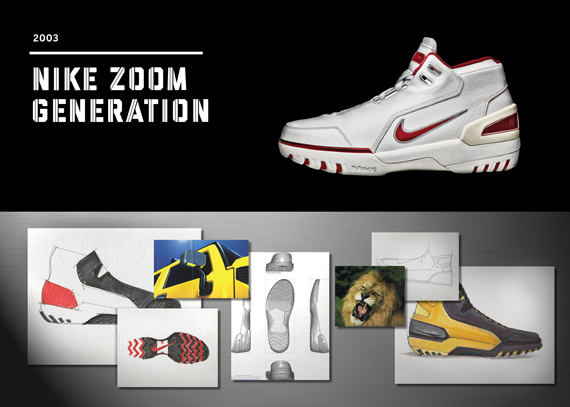
20 Years Of Nike Basketball Design: Zoom Generation (2003)
Nike Zoom Generation, 2003
“We will design you the most comfortable basketball shoe you have ever worn.”- Aaron Cooper
How do you go about equipping a warrior for court warfare and building a lasting relationship between a brand and athlete? The Nike Zoom Generation epitomizes Nike’s hunger for athletic insights and the start of a relationship with a young phenomenon named LeBron James. LeBron requested comfort as a priority and lead designer Aaron Cooper pledged, “We will design you the most comfortable basketball shoe you have ever worn.” This was a player who transcended Force, Flight or Uptempo and talk with the team singled out the idea of LeBron as a modern soldier. That led to a unique field boot styling and, in the quest for ultimate comfort, a soft foam was developed to form around the foot. In addition, a full-length Zoom Air, double stacked at the heel, was honed to perfection. On being handed the Zoom Generation in his size by Aaron, “LeBron put them on, jumped up about four to five times, stopped and said, ‘These are the most comfortable shoes I’ve ever worn’.” Mission accomplished.
–
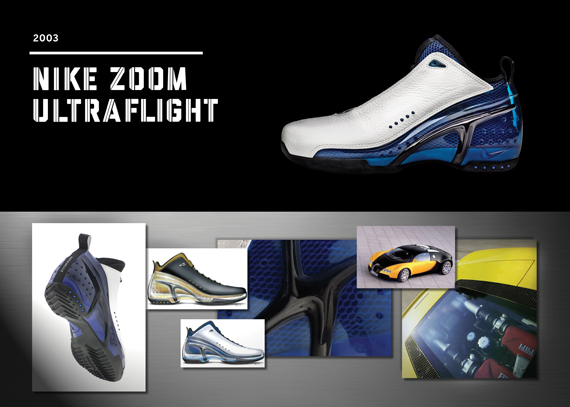
20 Years Of Nike Basketball Design: Zoom Ultraflight (2003)
Nike Zoom Ultraflight, 2003
“Design can put a dream on paper, so to speak, but it’s development and manufacturing that turn the dreams into reality.”- Aaron Cooper
After breaking new ground with the 2001 Nike Zoom Hyperflight, the objective was to maintain an innate sense of speed while building on a need for support. Continuing the Zoom lineage of the basketball shoe as an object of beauty, the Nike Zoom Ultrafight was the byproduct of absolute performance and total reduction. Half tradition, half amazing, this was one shoe with two distinct styles — an expected, premium leather side and a defiantly tech side. The development team managed to skillfully merge TPU, mesh and traditional fabrics seamlessly. Through pure experimentation and a conviction to manufacture the seemingly impossible, the shoe became a reality. Twinned with a perfect balance of thehuh? factor and classicism, Nike Basketball created its own challenge — beat that.
–
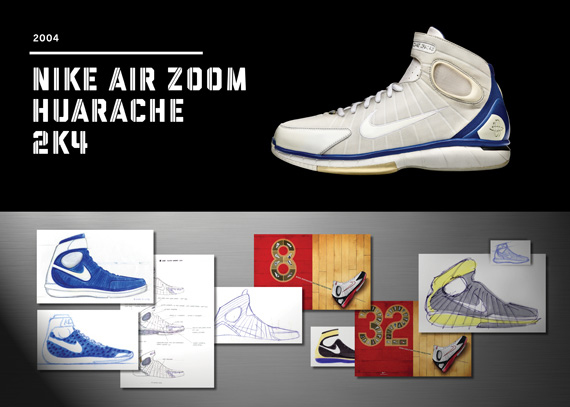
20 Years Of Nike Basketball Design: Air Zoom Huarache 2K4 (2004)
Nike Air Zoom Huarache 2K4, 2004
“The idea was to bring back classic basketball design principles in a very modern way.”- Eric Avar
To understand how far Nike had pushed the language of basketball shoe design, by 2004 experimentation had almost become a norm, meaning a clean, classic look appeared downright subversive. Balancing modern and classic was the Nike Air Zoom Huarache 2K4’s purpose, and Eric Avar and the team had a new kind of player in mind, operating in a zone that was neither Force, Flight nor Uptempo. In the resulting design, the Phylon sole and Zoom Air responsiveness, alongside an evolved version of the Huarache ankle support, combined to become a player and fan favorite. The Nike Air Zoom Huarache 2K4 also enjoyed time on the global center stage while being showcased on the feet of USA basketball athletes. There’s a reason it took several years for another shoe to earn the right to carry the Huarache moniker. With a sleek silhouette that shifted the prevailing mindset, as well as an influence that can still be seen today on Nike Basketball shoes, the Nike Air Zoom Huarache 2K4 sent basketball design down yet another new path.
–
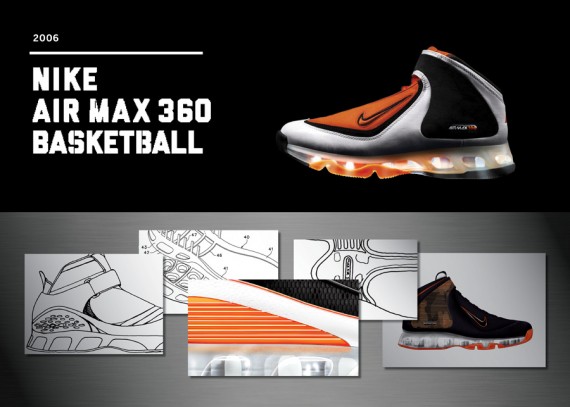
20 Years Of Nike Basketball Design: Air Max 360 Basketball (2006)
Nike Air Max 360 Basketball, 2006
“You learn from every project that you do, but I can’t think of many other projects where we learned so much.”- Tracy Teague
While the game of basketball was certainly evolving into a faster, up-and-down game, there was still a player who earned his paycheck with his back to the basket and under the boards. Max Air was always the platform for those athletes who appreciated some assistance on their return to terra firma. Behind the scenes, a brief to apply a variation of the Air Max 360’s running bag to a basketball shoe created multiple challenges. Engineers scrutinized the cage to evolve it from linear movement to the lateral movement demands of basketball. Pillar placement necessitated extra alterations as well in order to ensure support where it mattered. The Nike Air Max 360’s ultimate triumph was in taking away the midsole completely, but where the 360 project also excelled was in instigating even more specific basketball-centric innovation along similar lines. The LeBron 7’s carefully-honed full-length Air application, free of obstructions, was created on the 360 assignment’s learnings to reinforce Nike Basketball’s dominance.
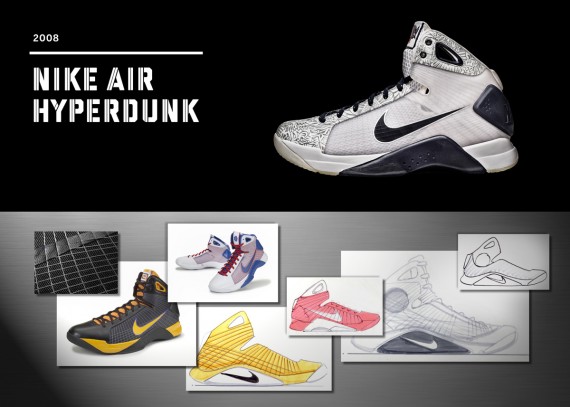
20 Years Of Nike Basketball Design: Air Hyperdunk (2008)
Nike Air Hyperdunk, 2008
“We were looking to do it in an expressive way — let’s reduce everything else around it and let the Flywire come to life.”- Eric Avar
Nike Flywire gave the notion of “Flight” some extra might. The Nike Air Hyperdunk went over the head of its opponents by borrowing a concept from one of the modern world’s most impressive architectural feats — suspension bridges. By applying super-strong nylon filaments for precise support akin to the cables of a bridge, the Nike Air Hyperdunk was able to radically reduce weight by providing support material only where it’s needed. Once the Nike Flywire proved its mettle in testing and converted any skeptics, the team’s approach was to create a design that allowed most of the shoe to fall away into the background to make the Flywire in the midfoot the focal point. Another new Nike innovation, Nike Lunarlon, would also make its first appearance in a basketball shoe as a key performance element of a design that borrowed elements from a shoe that, at the time, was only the stuff of legend, the Nike Mag. The Nike Air Hyperdunk seized the global stage when some of the USA Basketball athletes took to the courts of Beijing looking to recapture glory. This was a seminal moment for both American hoops and the future of basketball footwear design.
–
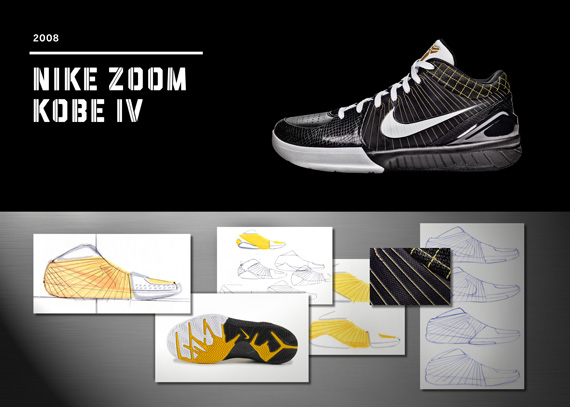
20 Years Of Nike Basketball Design: Zoom Kobe IV (2008)
Nike Zoom Kobe IV, 2008
“I sat down with Kobe and he was very clear — ’I want the lowest, lightest weight basketball shoe we can make.”- Eric Avar
Somewhere down the line, someone assumed that excess height and plenty of padding was the only way to protect players from themselves. That assumption became a certainty, until the myth was shattered. The Nike Zoom Kobe IV proved that a low-cut profile and superior support could work in unison — even for one of the most versatile players in basketball history. Kobe, a fan of the “beautiful game,” global football, noticed how athletes in a sport that stopped and started as abruptly as basketball weren’t asking for high top shoes. In fact, some of the world’s greatest goal scorers opt for the most minimal boots that can be designed.
Nike Flywire’s innate minimalism with an iconic outrigger, twinned with the reptilian Black Mamba upper and comic book villain inspiration, all added up to a look that stood alone. Bringing all this style in a performance low top further shaped the Nike Kobe series aesthetic moving forward, but more importantly the Nike Zoom Kobe IV changed a convention forever.
–
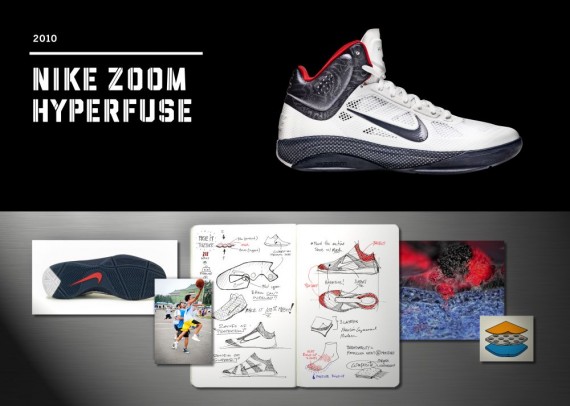
20 Years Of Nike Basketball Design: Zoom Hyperfuse (2010)
Nike Zoom Hyperfuse, 2010
“It makes you think differently about everything you associate with breathability and durability.”- Leo Chang
What instigates a game-changing innovation? A visit to China by Innovation Kitchen Designer Shane Kohatsu sowed some creative seeds for a new way of looking at sport footwear altogether. Seeing games played on the unforgiving blacktop in China in mesh running shoes and even hiking boots inspired a quest to create a balance of supportive, breathable and anti-abrasion elements that would unlock design entirely. The Nike Zoom Hyperfuse’s layered, lightweight composite construction was a definitive solution. To showcase the purity of the Nike Zoom Hyperfuse’s construction was to showcase the innovation itself. It took to colors in a way that leather just couldn’t — stacking layers and translucent materials meant a richer look than ever before, and the end of the white or black with a team pop color formula entirely.
–
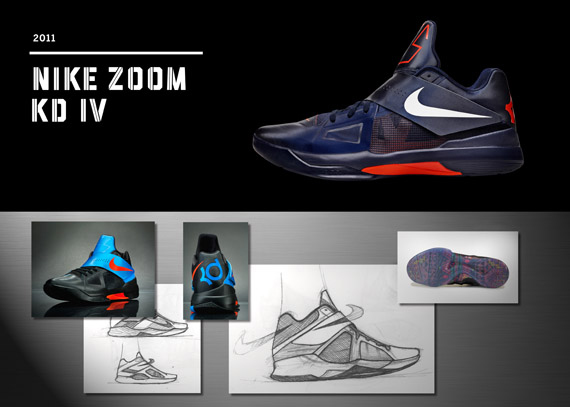
20 Years Of Nike Basketball Design: Zoom KD IV (2011)
Nike Zoom KD IV, 2011
“It’s about simply communicating the features of the shoe — everything has a purpose.”- Leo Chang
The signature shoe needs to reflect the athlete’s personality as well as his or her needs. Kevin Durant’s KD line has to encapsulate his remarkable versatility as well as his humble nature — confident without cockiness — resulting in designs made for all-around play and a complete range of motion. Kevin’s main needs are simple, though. In an exchange with lead designer Leo Chang, Durant exclaimed, “I want it light and I want it tight to my foot. That’s the key thing. Light and tight!” As part of a silhouette that’s lower than before to give Kevin some extra freedom, versatile lockdown is embodied in the Nike Zoom KD IV’s key feature: the Adaptive Fit strap. Built on conversations, there’s personal stories told within the Nike Zoom KD IV too. The detailed outsole commemorates Kevin’s relationship with family, his first coach, Big Chucky, D.C. and his home city, Seat Pleasant, Md.
–
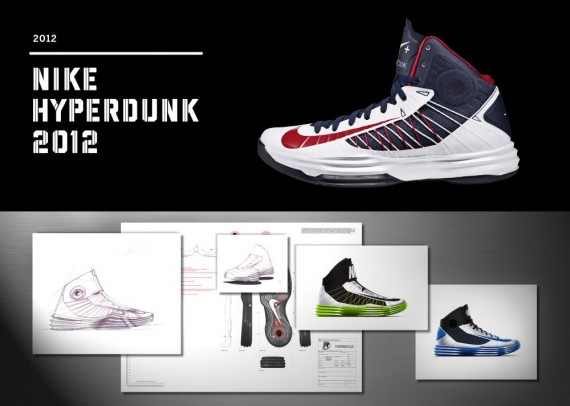
20 Years of Nike Basketball Design: Lunar Hyperdunk+ (2012)
Nike Hyperdunk+ 2012, 2012
“We’re always trying to evolve platforms and technologies — can we make it more responsive, lighter, more natural motion? There is no finish line.”- Eric Avar
A lot can change in four years. As the biggest global stage for sports is set up again in a new location, it’s time for the Nike Hyperdunk to make another statement. The landmark innovations of 2008 — Nike Flywire and Nike Lunarlon — have evolved significantly for basketball use, perfecting the formula for breathable, responsive, durable, locked-down performance. Now, under the hood, a new technology emerges that will change the way Nike links physical sport to digital services — Nike+ Basketball. The Nike Hyperdunk+ 2012 was designed by a collection of Nike Basketball’s best designers — Eric Avar, Leo Chang and Tracy Teague, among others; a true team effort that resulted in the fully-loaded version of Nike’s top innovations and the ultimate team shoe. Advanced Flywire uses high-strength cables that are loose when at rest and dynamic when the foot is in motion, tensing to stabilize the foot on the footbed. Lunarlon foam cushioning takes over as the primary cushioning system. The result is a soft, yet responsive, foundation. The element that truly changes the game forever is a new Nike+ Pressure Sensor built into each shoe that collects information about the user’s movement and then wirelessly transmits data to his or her phone. This is basketball footwear that senses the wearer — it literally comes alive. Most importantly, it inspires a baller to do more. Just Do it has leapt off the magazine pages and computer screens and into shoes. Now that’s progress.

